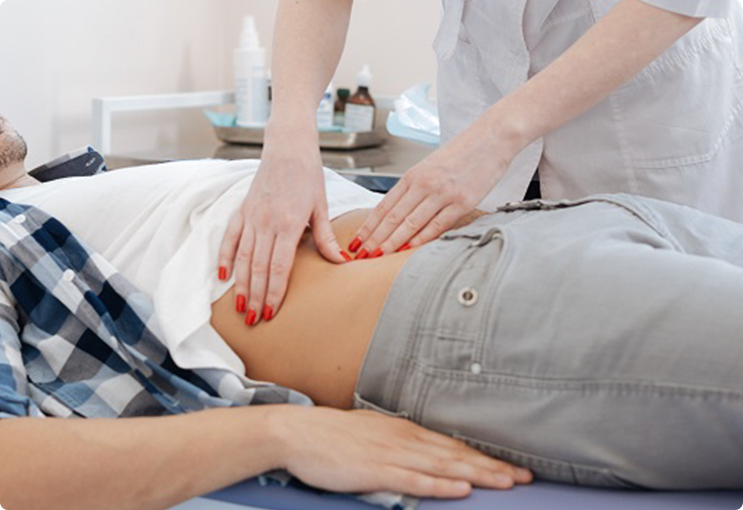GASTROSCOPY – PREPARATION FOR EXAMINATION
The basic condition for the planned gastroscopy is to follow the recommendations related to the preparation of the intestine for the examination and remain fasting, i.e. not to take food and dense liquids, coffee and tea for at least 6 hours and refrain from smoking and chewing gum for 6 hours before the examination.
Before the planned gastroscopy it is allowed to drink water in order not to feel thirsty up to 2 hours before the procedure. The last liquid (still water) can be taken 2 hours before the treatment in the amount not greater than a glass (250 ml). Performing a gastroscopy under anaesthesia in a person with a full stomach may expose him/her to life-threatening complications associated with absorption and aspiration of gastric contents into the lungs.
Medication taken chronically should be taken with a glass of water (250 ml) no later than 2 hours before the procedure. Do not take medication that could significantly hamper the examination. These are mainly drugs that alkalize gastric juice on the basis of aluminum salts (such as Rennie, Alugastrin) and calcium and magnesium preparations, which cause the mucous membrane to be covered with a thin, difficult to remove layer, which prevents proper evaluation of the mucousa. As previously agreed with your doctor, you should stop taking any medications affecting the clotting system (such as acetylsalicylic acid, clopidogrel, warfarin, acenocumarol, dabigatran, rivaroxaban, etc.) beforehand.
Diabetic patients should stop taking oral hypoglycemic drugs or insulin while on fasting (during the period without food, dense liquids, coffee and tea). It is advised to sign up for a morning examination and inform the registration about it.
In case of doubt, we recommend contacting the practitioner.
Some people require prophylactic administration of antibiotics before the examination. This applies to patients:
- with artificial heart valves and valvular defects
- with permanently implanted venous catheters and ports
- with immune deficiency and haematological diseases
- after transplantation of organs, taking immunosuppressive drugs
- with chronic liver and kidney disease
The final decision on the administration of the antibiotic is made by the doctor performing the examination after assessing the possible benefits and risks. If the examination is performed under general anaesthesia, you must be healthy (without fever, rhinitis or cough). If you experience any of the above symptoms, you should report your indisposition by phone the day before the planned examination.
After the examination under general (non-topical) anaesthesia, the patient should be picked up by an adult. No vehicles may be driven for 24 hours after general anaesthesia.
All available medical records and current results of the following tests must be presented prior to the examination:
- ionogram (K, Na)
- EKG (EKG please perform the EKG at least one day before the examination)
| We kindly inform you that laboratory tests can be performed Monday through Friday from 7:00-12:00 and on Saturdays from 8:00-12:00 in MediSpace. The waiting time for the result in our laboratory is approximately 1 business day. Up to 2 months the above tests are considered current. |
AFTER PROCEDURE YOU ARE OBLIGATED TO COME BACK SAFETLY WITH AN ADULT, RESPONSIBLE PERSON
IMPORTANT: If the patient has been referred for the procedure and is 55+ years old, has a BMI above 35 (kg/m²) or suffers from a serious comorbidities, he or she should consult with one of our specialists about the the possibility of surgery and anesthesia.
For inpatient anesthesiology consultation, please prepare:
- medical records of the patient’s chronic diseases and medications taken,
- basic laboratory test results from the last 2 months (CBC, sodium, potassium, creatinine, APTT, PT, INR);
- blood group result;
- ECG result from the last 2 months;
- in case of concomitant thyroid diseases – TSH, FT3, FT4 results from the last 2 months;
- for cardiac conditions such as ischemic heart disease, heart defects, cardiac arrhythmias – the result of ECHO-heart from the last 6 months and a certificate from the attending physician stating that the disease is in a stable state and does not require modification of treatment;
- in the case of neurological diseases – a certificate from the attending physician with information that the disease is in a stable state and does not require modification of treatment;
- in the case of taking anticoagulants (so-called “blood thinners”)
- a certificate from the attending physician with recommendations for the patient regarding the possible discontinuation of these drugs or switching to low-molecular-weight heparins
For teleconsultation, please send scans of the documents according to the above guidelines before the date of the anesthesiology consultation and deliver the originals on the day of anesthesia!
Please be advised that even a positive qualification by the anesthesiologist during the anesthesiology consultation is not a 100% guarantee that anesthesia will be performed on the day of the examination/procedure. The final decision to perform anesthesia is made by the anesthesiologist present on the day of the examination/procedure based on the patient’s current condition and compliance with the recommendations indicated at the consultation and general recommendations, especially regarding food consumption and post-anestezja care.
ATTENTION: We kindly inform you that the condition for reserving an appointment for endoscopic examination with or without general anesthesia is payment of the total prepayment within 24 hours of booking. In case of payment by bank transfer, please send confirmation to:
The fee is non-refundable unless the Patient cancels the examination no less than 48 hours before. The account number below to which payment should be made. Please include the Patient’s name in the title of the transfer.
mBank: 59 1140 2062 0000 5673 5500 1001


